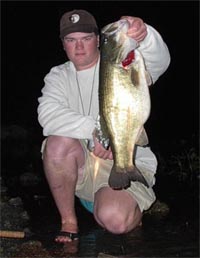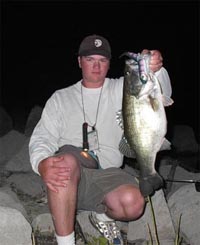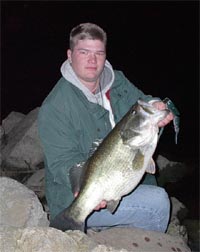Last year on November 30th I got a call from a fishing buddy who wanted to try a little night fishing at the local trophy bass lake. After experiencing a very tough month of October, I hadn't fished the lake at all in the last month. But the conditions looked perfect. There was a full moon and a strong weather front to hit at about midnight. So I finished up what I was doing and headed down to the lake, not arriving until after dark. The next 4 hours were the most incredible night fishing experience I've ever had. I only caught three fish, but they were 11.8, 10.2, and 4 pounds. Not to mention another 8-10 pound fish that came unbuttoned. People always say that summer is the time to night fish but I disagree. If I had one time of year to fish at night it would be November through mid December. That time is right around the corner! If you have never tried night fishing for bass, don't put it off any longer.
 THEORIES OF BEST CONDITIONS
THEORIES OF BEST CONDITIONS
There are many theories about what the best conditions to fish at night are. But for me it boils down to a few thoughts.
When the fishing is good during the day it will be good at night. That's it. Use the exact same criteria for deciding when to fish at night than you do to decide what will be a better day to fish. If you want to catch big fish at night fish during big fish seasons (late fall through early spring) on very good weather periods (falling barometer). If you want to catch numbers of fish at night fish during the numbers season (summer) on good weather periods (stable or falling barometer).
MOON PHASES
Then there is the question of the moon. Of all types of fishing you'd expect night fishing would be most influenced by the moon. But in my experience the period of the moon plays virtually no role in the bite. Season and the weather trump the moon every time. That's not to say moonlight isn't important. Think of the moon as a second sun. Moonrise and moonset can trigger a small increase of activity similar to, but not as strong as, dawn or dusk. I've also experienced this on a full moon when the moon was blocked out completely by clouds until about 2 a.m. The sudden appearance of the moon triggered the same kind of bite as a moonrise.
Although I don't feel it effects the bite, choosing the right phase will make life easier for you. The moon phase will determine how much light you will have and at what part of night. If you want moonlight early during the night fish around the first quarter. If you want moonlight late during the night fish around the third quarter. And, of course, fish the full moon for a bright moon all night, and a new moon for zero moonlight.
Finally, on a day-to-day basis, the best fishing will be at dawn and dusk, followed by night, followed by daytime. Some people think that the second half of the night is better than the first, but I haven't found this to be true. The only situation where this could be the case would be if the water you're fishing get's heavy night fishing pressure during the first half of the night.
LOCATIONS
Finding fish at night actually isn't too difficult. The quiet night brings fish out to primary structure that was too pressured to produce fish during the day. That beautiful rock pile that gets fished to death during the day can be a real hot spot at night.
The cover of darkness also brings fish up shallower than they would be during the day. It's not uncommon to find fish in only a few feet of water against the bank flushing out bait fish. During the summer these fish can be easily caught with shallow running crankbaits or topwater lures. During the colder months there can also be a shallow night bite. But this time for huge fish on jigs, spinnerbaits, and swimbaits.
In general, fish the same areas at night that you are finding fish during the day. Bass won't move long distances just for the night.
 LURES
LURES
The lures I use most at night are spinnerbaits, topwater, jigs/plastics, crankbaits, and swimbaits. As a general rule, use lures that are bulky and dark.
I feel that spinnerbaits are the "perfect" night fishing bait. They can be fished at any depth, in most cover, and appeal to inactive fish at night. And, most of all, the vibration makes it easy for fish to find spinnerbaits in the dark water. The standard night fishing spinnerbait that you will see in stores is a black bait with a large single "black nickel" Colorado blade. This is a good blade, but I prefer something slightly different. My ideal night blade is a 1/2 ounce head, hand-tied black round rubber skirt, and two medium sized nickel Colorado blades. The 1/2 oz keeps it on the bottom, the hand tied skirt won't have to be readjusted in the dark, and the smaller twin blades give off a more natural vibration.
SPINNERBAITS
I retrieve spinnerbaits slowly along the bottom. Wait for the bait to hit bottom and then begin a retrieve just fast enough to keep the blades turning. If you lose contact of the bottom stop and let the spinnerbait sink back down. Another effective night time retrieve is a lift and drop. This works best with the standard single Colorado night blade. As the spinnerbait sinks after the cast you will be able to feel the single blade thumping. Be alert for bites on the sink. After it hits bottom make a few quick cranks with your reel then let it helicopter back to the bottom. Again, be ready to set the hook while it falls (which is why I recommend using your reel to move the bait). Continue this lift and drop retrieve all the way back in.
TOPWATER
My favorite way to fish at night is with topwater. The fish always hit your bait when you're least expecting it and it still scares the bejeebers out of me sometimes. My most successful topwater bait has been a buzzbait. I'm not really too picky about which buzzbait I use. I've done very well at night with all sizes and combinations of blades and skirts: plastic or metal, clackers or silent, tandem or single. It may be wise to adjust to fish activity, though (i.e. big noisy bait in heavy cover with super active fish, small quiet buzzbait with little cover and spooky fish). Be brave when throwing buzzbaits at night. There will be quality buzzbait fish in the thickest cover just like during the day.
Pretty much all other topwater baits will work as well. The big jointed Jitter Bug in solid black is a classic night bait. A solid black super spook is another good choice. Be sure to replace the hooks on these lures with Gamakatsu EWG trebles.
There is a trap with topwater baits that I have a very hard time avoiding. The trap is simply to fish them. You can almost always catch a few fish on topwater at night during the warmer months of the year, but you may be cheating yourself out of more and bigger fish that could be caught on jigs or plastics. They aren't a good choice for covering water, but jigs and plastics are by far the most prolific baits to use at night.
PLASTICS
The classic night time bait is a 10-inch black Berkley Power Worm. This is a very productive, versatile worm. I throw it rigged with a pegged 1/4-3/8 oz black bullet weight and a 4/0 Superline Gamakatsu EWG worm hook. This is a great worm to cast around weedy structure. Its slick profile will penetrate weed pockets easily without getting snagged.
The Power Worm will also work around rocky structure, points or rock piles, but I prefer jigs or brush hogs. These both reproduce a crawdad better than the worm. The jig I use is a 1/2 oz black jig with a heavy hook and a rattle. For a trailer I will usually use a Zoom Super Chunk. This jig is best for fishing deeper rockpiles or the ends of points. If you really need to cover water with a jig this bait will suffice as well.
The brush hog is my finesse night bait. When nothing else will work a Zoom full sized Brush Hog always comes through for me. I rig it with a 1/16-1/8 oz bullet weight, a bead, and the same 4/0 hook mentioned above. My favorite color at night is Red Bug and June Bug. This is a slow sinking snagless bait. Cast it over shallow rock piles, weed beds, or points and slowly, slowly shake it back in. I spray a liberal amount of BANG attractant on all my jigs and plastics at night.
HARD BAITS
If covering water is your goal at night, crankbaits are your bait. Some of my favorite night fishing involves burning rattle traps as fast as you can reel tight against the shoreline. When the fish are up shallow actively chasing bait fish you can cover a huge amount of water and catch a ton of fish at the same time doing this. If the fish are deeper you can cover a lot of water with a deep diving crankbait such as a Normans DD22. But although I have caught a bunch of fish on these two lures, I haven't broken 4 pounds with either.
The best areas for throwing crankbaits at night for me has always been around very rocky structure. I believe the crankbait crashing into the rocks creates the noise to trigger aggressive strikes. If the area is more dominated by weeds a loud buzzbait will probably be a better choice for covering water, especially during the summer.
Last, but definitely not least, we get to swim baits at night. The largest night time bass I've ever caught, 11.8 pounds, fell for a M.S. Slammer swim bait. Swim baits (and trout plugs) are as effective at night as they are during the day. My favorite night trout plug is the wooden M.S. Slammer. It is an extremely buoyant lure that makes a lot of noise on the surface. Of course, I feel like I am falling in the topwater trap even with swim baits. Sinking swim baits at night are something I intend on throwing a lot of in the near future.
 LURE COLORS
LURE COLORS
Under low light conditions colors fade to gray. You'll notice color perception is one of the things you'll lose as it gets dark. Choosing the right color at night is mostly a decision on how much contrast you want your lure to have with its surroundings.
Even if it looks black, at night the brightest thing around is they sky. If you hold different colors of lures against this "bright" backdrop the one that will stand out most clearly is the darkest lure. Try it yourself one night. Therefore the best, most contrasting, color to use at night is black. At least for lures that you expect bass to see from the bottom up.
Lures fished on or near the bottom are a different story. At night the lure that will provide the most contrast is the color that provides the greatest difference in brightness from its surroundings. More simply, if the bottom is dark a white lure will show up best. If the bottom is light a black lure will show up best. More commonly the bottom is somewhere in between light and dark. In this case either black or white will provide some contrast. I generally stick to darker colored lures. I know it will have reasonable contrast from the bottom, and excellent contrast whenever it leaves the bottom.
In other words... Fish dark colors!
EQUIPMENT
The main piece of night fishing equipment is your light. I'm a firm believer that excessive light will spook shallow fish. So try to use as little light as possible. If there's enough moonlight you can often do without light all together (Note: if fishing from a boat always keep safety in mind first before turning off all your lights).
Black lights can be a very fun tool to use at night. A black light produces very little visible light, but a great deal of ultra violet light. The radiation emitted by this light will make anything with certain florescent material in it glow brightly. Florescent line is produced by several line companies, and it glows like rope when exposed to black lights at night. This is helpful for both tying knots and detecting "line bites".
Since black lights produce much less visible light, they won't spook fish as much as regular lights. Be carful though, many commercial black lights come with two bulbs. One a black light, and one a regular florescent bulb. Although the regular bulb makes seeing targets much easier, you'd be better off not using it.
Black lights are readily available for boaters. There are battery operated black lights for the shore fishermen as well, although they may be more difficult to find. I currently use a small 6" black light while shore fishing. It runs on 4 AA batteries and hangs near my waist. This little black light also provides just enough visible light to walk with on a moonless night. I also carry a small flashlight for landing fish and walking back to my truck.
SAFETY
It goes without saying that you have to be extra careful at night. I'm shore-bound for the most part but I've still had to deal with burnt-out flashlights, sprained toes, cuts, hooks buried in fingers, buzzing rattlesnakes, feral pigs, and dead car batteries. Who knows what more if boats were allowed at night on the lakes I fish. Just use some common sense here.
Bass fishing is better at night than it is during the day. Do you need any other reason to fish at night?


 Advertising
Advertising